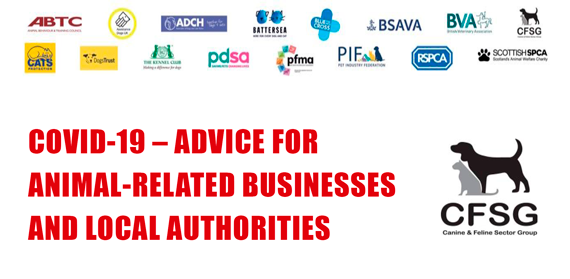
New guidance for pet businesses operating during the coronavirus crisis has been published yesterday (Tuesday).
The document, entitled ‘Covid-19 – Advice for Animal Related Businesses and Local Authorities’, is, of course, subject to change depending on Government advice.
But it aims to offer ‘clear advice’ to pet businesses on how they can comply with the new rules on social distancing, hygiene and travel. The guidance covers a wide range of businesses dealing directly with pets, including pet shops selling livestock.
It was put together by the Caine & Feline Sector Group, which includes the Pet Industry Federation and the Pet Food Manufacturers Association to ‘assist animal businesses and breeders to operate in a safe manner to protect the health of their staff and clients’.
Nothing in the document is intended to be anything other than guidance for use in ‘the current extraordinary circumstances’, the CFSG says, and it aims to balance the potentially competing interests of public health and the need for the economy and business to keep working.
CARRY ON
Government is keen to see businesses continue to operate unless they are on the list of explicitly banned businesses and venues – and it has not required ANY other businesses to close. Indeed, the Group says, it is important for business to carry on, not least to ensure the economy keeps working and in the case of pet businesses to help safeguard the welfare of the nation’s pets.
“Pet businesses play a key role in this and should operate within the strict advice on social distancing and hygiene,” the CFSG says.
Members of the public is requested to leave their house only for very limited purposes, which means pet-owners will NOT be able to travel to access the services outlined in the document, but service providers CAN travel to them door to door while still meeting the social distancing and hygiene requirements.
The CFSG has produced a handover protocol between people walking friends’ and neighbours’ dogs, which should also be used when handing over dogs between a business and client.
BOARDERS, WALKERS AND DAY CARE.
The document covers protocols for a variety of pet businesses, including boarding kennels & catteries, home-boarders, doggy day care, dog walkers, groomers, and dog and cat breeders. Guidance for pet rehoming and rescue centres is to be issued shortly.
GROOMERS
Grooming services present a challenge, the CFSG says, as there is a risk that the virus may be carried on the dog’s coat.
“Pets from households with coronavirus present higher risk given the nature of the service. In many cases, groomers may therefore consider that maintaining contact with clients remotely and offering advice to them about their pet’s coat is the safest outcome for all concerned.
“Government regulations make it clear that an owner taking a pet by vehicle to be groomed is unlikely to be essential travel, however there may be welfare grounds on which grooming may be necessary, particularly if the lockdown persists.”
Mobile groomers may continue to operate providing that they can maintain social distancing and follow the handover protocol set out by CFSG.
Groomers whose business relies on pets coming to them CAN continue to work if they collect them and as long as they can disinfect their vehicle between collections and then only pets from one household should be collected at one time.
Only one dog may be groomed at a time and the dog should have left the premises, with disinfection of the premises occurring, before the next one is allowed to enter. In all cases payment should be made by card or BACS.
PET SHOPS
Pet shops have not been required to close and can continue to provide pet food and other essential supplies. However, a journey solely to purchase a pet is not considered essential and is not allowed. If pet shops sell pets (other than kittens and puppies, which is now banned), the CFSG says they should do so only when the customer has come to the shop to purchase essential items. Selling livestock already in stock or coming through the supply chain may continue subject top the same condition.
A decision to sell small pets should be made on an individual basis, having made a risk assessment of the shop’s ability to carry out the function in accordance with the Government’s coronavirus safety guidelines and subject to the ability of staff on duty to provide informed care advice about the particular species being sold.
Pet shops can also consider arrangements for home delivery of items.
Click here to read and download the full guidance document


